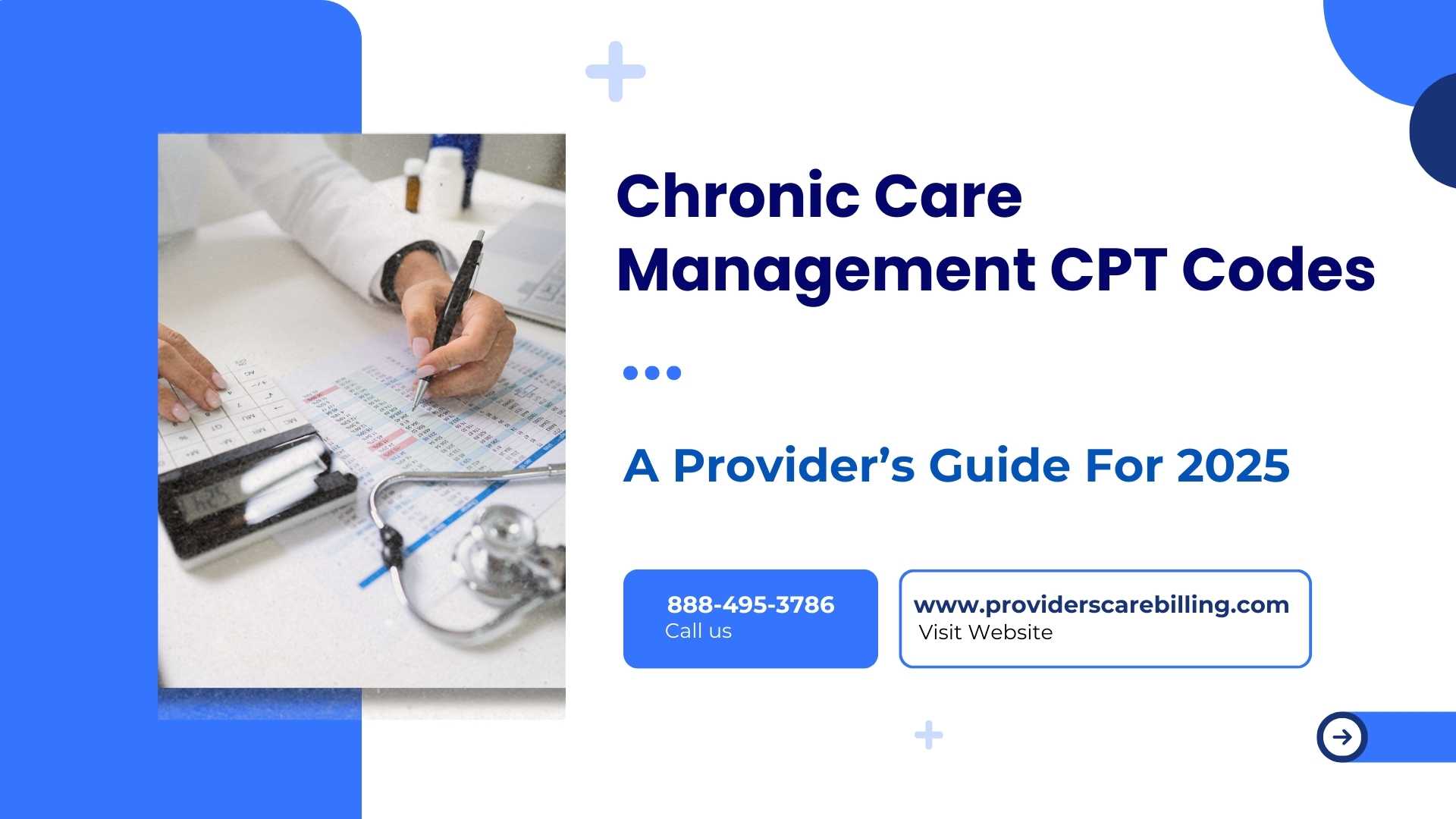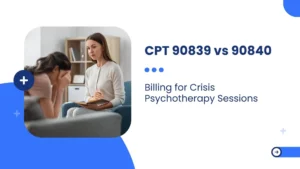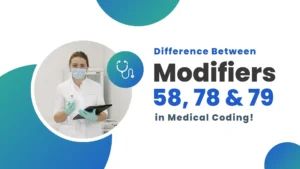Have you ever thought of how many Americans have two or more chronic conditions (more than 133 million)? Medicare providers are paying millions of dollars every year in Chronic Care Management (CCM) programs. However, over 40 percent of practices that are eligible for this revenue fail to achieve it due to the inability to bill CCM correctly. Adequate billing is now more than just an option; it is part of enhancing patient outcomes and increasing revenue cycles.
What is Chronic Care Management?
Chronic Care Management (CCM) encompasses not only physical, ongoing clinical care of the patients who fit the following criteria:
- Chronic conditions (2 or more).
- Anticipated 12-month duration or above.
- Represent a substantial threat of morbidity or mortality.
CCM includes:
- Care plan development
- Medication management
- Collaboration with expert people.
- Monthly check‑ins
- Preventive care reminders
The social determinants of health support the effectiveness of the CCM program. CPT codes like 99490, 99439, 99487, and 99489 will allow providers to be reimbursed for these corn-behind-the-scenes activities. Integrating medical billing services can help track care plans and communications efficiently.
What are the Conditions that are eligible in Chronic Care Management?
The definition of Medicare is very loose. Some typical qualifying chronic reasons are:
- Diabetes
- Hypertension
- COPD
- Renal Failure
- Heart Failure
- Dementia
- Depression
- Asthma
- Arthritis
- Cancer
- Stroke history
It usually qualifies as long as the condition is projected to take at least a year or longer and will necessitate continuous clinical care.
CPT Codes of Key Chronic Care Management in 2025
Understanding revenue cycle management in medical billing is crucial for correct billing, Medicare compliance, and maximizing reimbursement.
1. CPT Code 99490
Description: Non-complex chronic care (management). Consumes 20 minutes of clinical personnel time or calendar month, which is controlled by a physician or qualified health professional as part of a comprehensive care plan.
- When to Use It: It is used with standard CCM patients who require care coordination or follow-up but are not regarded as complex cases.
- Reimbursement: dependent on the state, the average is $62–75/month.
- Keyword Boosters: 99490, CPT 99490, 99490 CPT description.
2. CPT Code 99439
Description of every 20 minutes of non-complex CCM in the same month.
- Why It Matters: It enables practices to charge additional time for the first 20 minutes of CPT 99490.
- Example of Use Case: Consider a case where your clinical team took 40 minutes:
- 99490 → first 20 minutes
- 99439 → additional 20 minutes
For the official guidelines and detailed reimbursement rules, see the CMS Chronic Care Management Services PDF.
3. CPT Code 99487
Complex CCM, requiring:
- 60 minutes of nursing personnel time.
- Medical decision-making of moderate or high complexity.
Best For:
High-risk patients are those who have poorly controlled diabetes, myocardial infarction, chronic obstructive pulmonary disease (COPD), or problems affecting multiple organ systems.
4. CPT Code 99489
Every 30 minutes of intricate CCM after the first 60 minutes is charged under 99487.
When to Use:
Patients who need in-depth and coordinated care, multidisciplinary, or the incorporation of social services.
5. CPT Code 99496
High-complexity decision-making transitional care management (TCM) after discharge of:
- Hospital
- SNF
- Rehab
- Observation status
Many CCM patients are also eligible for TCM, making incident-to billing guidelines crucial for maximizing reimbursement.
What is the Rationale of Incorporating TCM Codes in a CCM Guide?
Since a significant portion of CCM-eligible patients are also eligible to receive TCM, the appropriate use of 99496 can generate revenue and ensure continuity of care.
6. Other Important Codes
- CPT 99499 – Unlisted appraisal and management service. Infrequently used, but useful when the services do not belong to standard CCM categories.
- CPT Code 99424 – Applied in primary care management (PCM) of one high-risk chronic disease.
- CPT Code 99426 – Extra PCM hours over the base minutes.
- CPT Code 99427 – Extra 30 minutes of PCM provided by a physician/NP/PA.
- CPT Code 99491 – CCM done personally by a physician/NP/PA- at least 30 minutes a month.
- CPT Code 99309 – Applied to further nursing facility care- typically applied with CCM billing strategies.
2025 CPT Codes Chronic Care Management Codes
As of 2025, CMS is still reinforcing documentation, and it includes:
1. Better time tracking specifications.
Every minute billed must be:
- Measurable
- Documented
- Assigned to a qualified clinical business.
2. Improved care plan conditions
Plans must be:
- Patient‑centered
- Accessible electronically
- Updated regularly
3. Increased telehealth liberation
The number of services available through CCM can be increased now in a virtual manner.
4. Stricter consent language
Patient awareness of: must be recorded by the providers.
- Copays
- Services provided
- Right to opt out
Chronic Care Management to Medicare Billing
The following guidelines should be observed to be fully billed to get complete Medicare reimbursement of CCM services:
1. Verify eligibility
The patient must have:
- Two or more long-term illnesses.
- Conditions that are anticipated to take more than 12 months.
- Signed consent
2. Document all the time
Include documents for:
- Phone calls
- Chart reviews
- Care coordination
- Medication management
- Specialist communications
3. Use the correct CCM CPT codes
- 99490 – 20 minutes of non‑complex care
- 99439 -20 more minutes (it can be used with 99490 or 99487)
- 99487- first 60 minutes of complex care.
4. Avoid billing conflicts
- Do not charge CCM with some TCM codes on the same day.
- Do not combine CCM with the international operating packages.
- Do not bill some RPM codes if all the requirements were not fulfilled.
5. Make claims with proper documents
The number one cause of CCM claim denials is a lack of complete documentation.
Conclusion
Learning CPT codes of Chronic Care Management in 2025 would be needed to enhance the patient outcomes and financial performance. The correct coding of 99490, 99439, 99487, 99489, 99496, 99499, etc, is the way to sustainable reimbursement.
Got a willingness to improve compliance, stream billing, and optimize reimbursement in your organization? Providers Care Billing LLC can help you achieve its experienced medical billing services, medical coding services, credentialing, and revenue-cycle management services.
Ready to improve CCM revenues and decrease claim denials? Get professional assistance now – call our billing specialists in CCM.
📞 Call Now: 888-495-3786
📧 Email: Info@providerscarebilling.com
FAQs
What is the CPT code of chronic care management?
CPT of chronic care management is 99490; it deals with 20 minutes of non-complicated chronic care management services. This code is generally used by Medicare to make a payment.
How does 99487 differ from 99490?
- A code 99490 is a non-complex chronic care management (CCM) code since it involves 20 minutes of service per month.
- 99487 is a complicated CCM code that requires 60 minutes of service monthly and increased medical decision-making.
What is CPT 99490 under chronic care management?
CPT 99490 refers to non-face-to-face chronic care coordination of at least 20 minutes monthly and is applied in the case of a patient who has two or more chronic ailments.
What is your method of Medicare billing for chronic care management?
Bill Medicare by writing the consent of the patient, noting all the CCM time, and appropriate CPT codes (e.g., 99490 or 99487).




